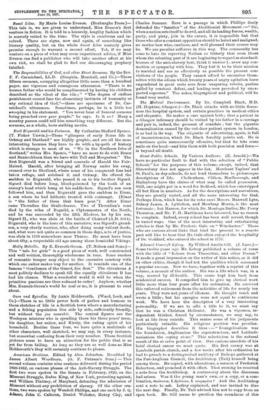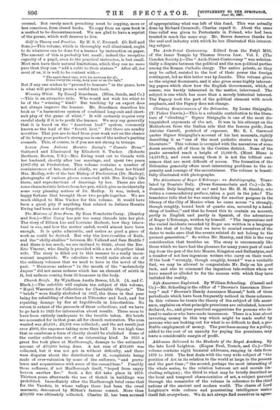Edward Cracroft Lefroy. By Wilfred Austin Gill. (J. Lane.)— Some
twelve years ago Mr. Lefroy published a volume of verse with the title of "Echoes from Theocritus, and other Poems." It made a great impression on the writer of this notice, as it did on other critics, though it had not the qualities which command a popular success. Now we have, together with a reprint of this volume, a memoir of the author. His was a life which was, in a way, marred by ill-health. This cause kept him back from academical success. It compelled him to give up clerical work little more than four years after his ordination. He survived this enforced retirement from the activities of life for nearly ten years. They were not years of idleness. He thought much and wrote a little ; but his energies were not equal to continuous work. We have here the description of a very interesting personality. If we are to affix a title to it, we must say that he was a Christian Hellenist. He was a vigorous, in- dependent thinker, forced by circumstances, we may say, to look at life from outside. This makes some of his judgments particularly valuable. His religious position was peculiar. His biographer describes it thus :—" Evangelicalism was the foundation, Anglicanism the superstructure, and Latitudi- narianism the coping atone." This eclecticism is the natural result of the ab extra point of view. One curious anecdote of his brief clerical career we must quote. His first curacy was at Lambeth parish church, and a few weeks after his ordination he had to preach to a distinguished auditory of Bishops gathered at the Pan-Anglican Council, the Archbishop (Tait) himself being among them. He copied, with alterations, a sermon of Frederick Robertson, and preached it with effect. That evening he received a note from the Archbishop. A controversy about the discourse had arisen. -Was it the young man's own, or a copy, or a com- bination, etkirros, Sinfrews, l xexpauirn F And the Archbishop sent a note to ask. Lefroy explained, and was invited to dine the next day. Finally, Dr. Tait advised him not to copy from an open book. Mr. Gill seems to question the soundness of this
counsel. But surely much preaching must be copying, more or less conscious, from closed books. To copy from an open book is a method to be discountenanced. We are glad to have a reprint of the poems, which well deserve to live.



















































 Previous page
Previous page